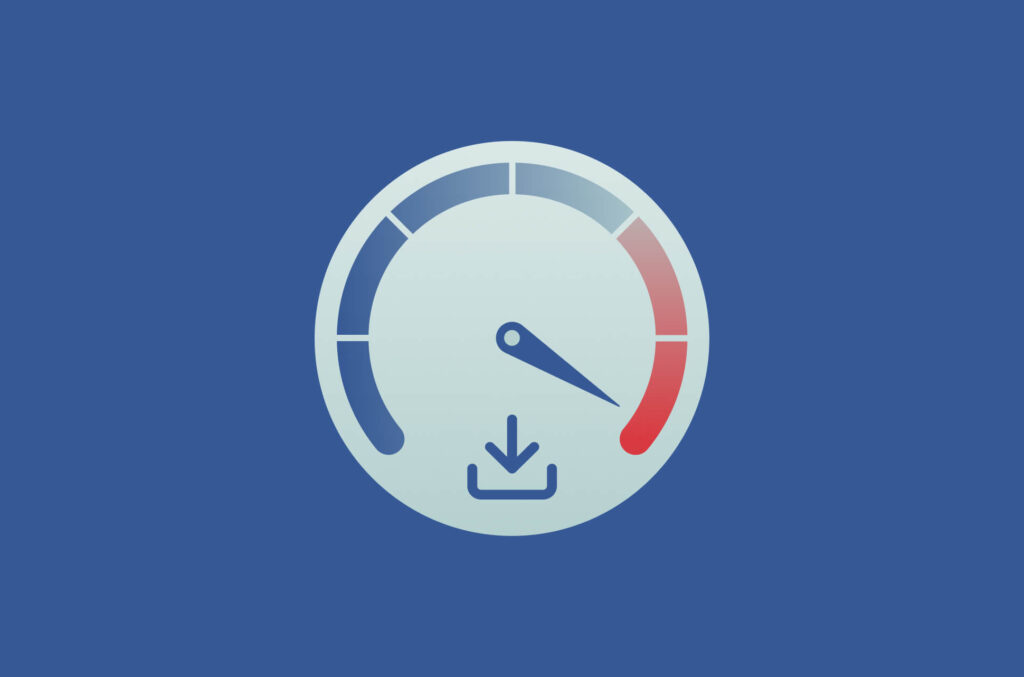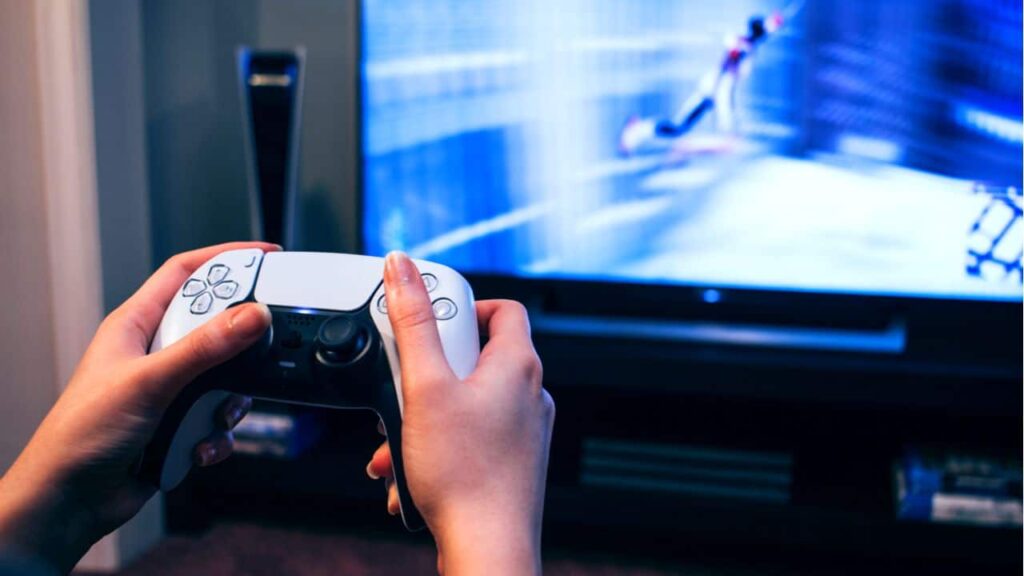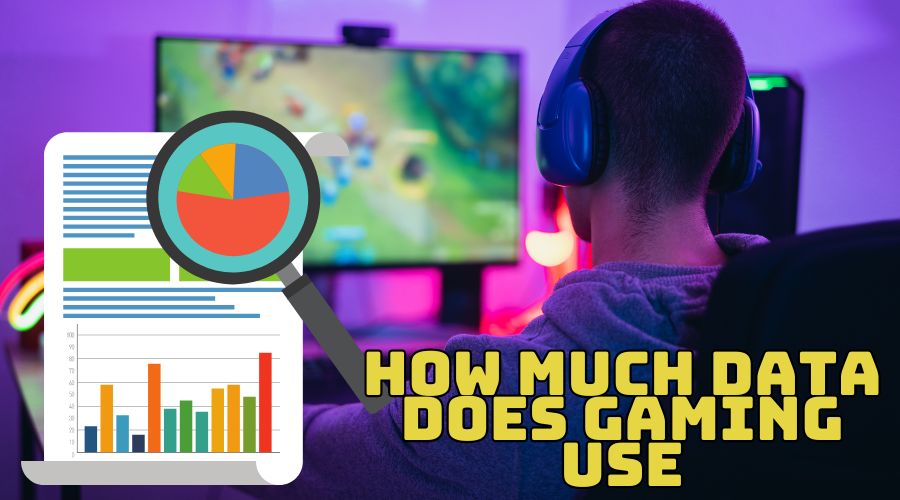Have you ever wondered how much data online gaming consumes? With the rise of online gaming and the increasing popularity of multiplayer games, understanding data usage is crucial for gamers who want to stay within their data limits.
Online gaming has become a prominent form of entertainment for people of all ages. However, many gamers need to know how much data their favourite games consume. This lack of knowledge can result in unexpected data overages and additional charges from their internet service providers.
This comprehensive guide will delve into online gaming data usage and provide the information you need to make informed decisions about your gaming habits. Understanding data consumption can help you optimize your gaming experience and avoid unnecessary costs, whether you are a casual gamer or a hardcore player.
Understanding Data Usage in Gaming

Before we delve into specific numbers, let us first understand what contributes to data usage in gaming. Several factors influence the amount of data consumed during gameplay:
- Game Type: The type of game being played significantly impacts data usage. Due to constant communication with servers and other players, online multiplayer games consume more data than single-player or offline games.
- Graphics Quality: Games with high-quality graphics and detailed textures require more data to render images smoothly. Streaming these visuals in real time can consume significant bandwidth.
- Game Updates and Patches: Games often receive updates, patches, and downloadable content (DLC), which can contribute to data usage. These updates vary in size but can be substantial, especially for large games with frequent updates.
- Streaming and Cloud Gaming: Streaming platforms and cloud gaming services allow players to stream games over the internet, eliminating the need for high-end hardware. However, this method requires a stable internet connection and consumes data continuously during gameplay.
- Voice Chat and Social Features: Many online games offer voice chat and social features, which require additional data for communication with other players and servers.
Now that we have a better understanding of the factors influencing data usage let’s explore how much data different gaming platforms and activities consume.
Common Online Games’ Data Usage in 1 Hour
Online gaming has become immensely popular, with millions engaging in various titles across platforms. Here is a breakdown of data usage for some common online games based on one hour of gameplay:
Game Data Usage (Per Hour) Microsoft Flight Simulator (2020) 700MB Destiny 2 300MB Valorant 250MB Counter-Strike 2 250MB Battlefield 2042 200MB Apex Legends 200MB Overwatch 2 150MB Dota 2 120MB Warframe 115MB Fortnite 100MB Battlefield V 100MB Call of Duty: Warzone 160MB Call of Duty: Black Ops 4 (COD) 80MB Call of Duty: Modern Warfare 2 (2022) 80MB Team Fortress 2 80MB Rainbow Six Siege 70MB Fall Guys: Ultimate Knockout 70MB Grand Theft Auto V Online (GTA) 60MB Teamfight Tactics 60MB Rocket League 40MB PlayerUnknown’s Battlegrounds (PUBG) 40MB World of Warcraft 40MB Minecraft 40MB Call of Duty: World War II (COD) 40MB Sea of Thieves 30MB Monster Hunter: World 30MB Starcraft 2 20MB Diablo IV 20MB Final Fantasy XIV 20MB Marvel Snap 20MB Rainbow Six Siege 70MB Hearthstone 3MB
These approximate figures vary based on graphics settings, game mode, and network conditions. Additionally, the size of these games can vary significantly, with some titles requiring several gigabytes of storage space.
How to Reduce Data Consumption during Gameplay

If you find yourself in a situation where data usage is a consideration, here are some strategies to help reduce data consumption during gameplay:
- Adjust Graphics Settings: Lowering graphics settings within the game can significantly reduce data usage. Graphics settings such as resolution, texture quality, and shadow detail can be adjusted to prioritize performance over visual fidelity, thereby decreasing the data required to render game visuals.
- Limit Background Downloads: Prevent automatic updates, downloads, and uploads from running in the background while gaming. Background processes such as software updates, cloud syncing, and streaming services can consume data without your knowledge, so closing or pausing these activities before starting a gaming session is essential.
- Choose Offline Modes: Many games offer offline modes or single-player campaigns that do not require an internet connection. Opting for offline gameplay can eliminate data usage. It is an ideal option for conserving data when internet connectivity is limited or when playing on a mobile device using a data hotspot.
- Monitor Network Usage: Keep track of your network usage to identify any data-intensive activities running concurrently with gaming. Most operating systems and routers offer tools or settings to monitor network traffic, allowing you to identify and address any data-hungry applications or processes.
- Use Wi-Fi Whenever Possible: If you are playing on a mobile device or using a notebook connected to a mobile hotspot, prioritize connecting to Wi-Fi networks whenever possible. Wi-Fi connections typically offer higher data allowances and faster speeds than mobile data networks, reducing the risk of exceeding data caps during gameplay.
- Optimize Voice Chat Usage: Voice chat features in online games can contribute to data usage. Consider using text chat or limiting voice chat usage to conserve data, especially if you are playing on a mobile network with limited data allowances.
- Monitor Data Usage: Monitor your data usage to ensure you stay within your data cap, especially if you are on a limited data plan. Many internet service providers offer tools or apps to monitor your data usage in real-time, helping you avoid unexpected overage charges.
How do you download games faster?

Slow download speeds can be a major buzzkill, but there are several strategies you can try to help speed up the process. Here are some tips on how to download games faster:
1. Check Your Internet Connection
Before downloading a game, ensure your internet connection is stable and fast. If you use a Wi-Fi connection, try moving closer to the router or connecting directly with an Ethernet cable for a faster and more reliable connection.
2. Close Unnecessary Programs
Downloading games can use a lot of bandwidth, so it’s a good idea to close any unnecessary programs or browser tabs that are using up your internet speed. This will free up more bandwidth for the game download and help it go faster.
3. Clear Your Browser Cache
If you are downloading a game through a browser, try clearing your browser cache before starting the download. This can help improve download speeds by removing any clutter or temporary files that might slow the process.
4. Use a Download Manager
Consider using a download manager to help optimize your download speed. Download managers can speed up downloads by breaking files into smaller segments and downloading them simultaneously, improving overall download speed.
5. Change Your DNS Settings
Changing your DNS settings can help improve download speeds. You can use a public DNS server like Google DNS or OpenDNS to see if it enhances download speed.
6. Use a VPN
A VPN helps improve download speeds by routing your internet connection through a different server. This can be especially helpful if your ISP is throttling your download speeds for certain types of content.
7. Download during Off-Peak Hours
Downloading games during off-peak hours, such as late at night or early in the morning, can help improve download speeds. This is because there is less internet traffic during these times, which can result in faster download speeds.
How much bandwidth does it take to play games?
Bandwidth is the maximum rate at which data can be transferred through a network connection, and it is measured in bits per second. The bandwidth required to play games can vary depending on factors such as the type of game, the number of players, and the level of graphical detail. Generally, gaming requires relatively low bandwidth compared to other online activities, such as streaming video. Here is a general overview of bandwidth requirements for gaming:
- Minimum: A bandwidth of 1-3 Mbps (Megabits per second) is typically sufficient for basic online gaming with minimal latency.
- Recommended: For a smoother online gaming experience with moderate graphics settings and minimal lag, a bandwidth of 5-10 Mbps is recommended.
- High-End Gaming: For high-definition gaming with maximum graphics settings and minimal latency, a bandwidth of 10+ Mbps may be necessary.
These bandwidth requirements are approximate and can vary based on the specific game, network conditions, and other factors. Overall, gaming tends to be relatively forgiving regarding bandwidth compared to other internet activities, making it accessible to many users.
How do we reduce the delay in the game?

Reducing game delay, latency, or lag is essential for a smooth gaming experience. Here are some tips to minimize latency:
- Check Your Internet Connection
A poor internet connection is one of the most common reasons for delays in online gaming. To ensure a stable and strong connection, connect via Ethernet cable instead of Wi-Fi. This will help reduce latency and ensure faster response times.
- Close Unnecessary Programs
Multiple programs running in the background while gaming can cause delays and slow down your system. Close any unnecessary programs or applications to free up resources and improve performance.
- Update Your Drivers
Outdated graphics drivers can also contribute to delays in gameplay. Ensure your graphics drivers are current to ensure smooth performance and eliminate potential glitches or delays.
- Lower Graphics Settings
If your computer or gaming console struggles to keep up with the demands of high-resolution graphics, consider lowering the graphics settings in-game. This can help reduce delays and improve overall performance.
- Optimize Your Hardware
Sometimes, delays in gaming can be attributed to outdated hardware. Consider upgrading your computer’s RAM, graphics card, or processor to ensure better performance and reduce delays in gameplay.
- Choose Servers Wisely
If playing online multiplayer games, choose servers closer to your location. This can help reduce latency and ensure a smoother gaming experience immediately.
- Reset Your Router
If you are experiencing delays in online gameplay, try resetting your router to refresh the connection and eliminate any potential issues causing delays.
Frequently Asked Questions (FAQs)
Q. Does online gaming use more data than other online activities like streaming video?
Online gaming generally uses less data than streaming video. While the exact data usage varies depending on the game and settings, gaming typically falls within a moderate range of data consumption.
Q. Is 100GB of data sufficient for gaming?
Most internet plans nowadays offer unlimited data; however, a mobile broadband plan with 100GB of data would typically be adequate for gaming. The sufficiency would hinge on the choice of games and the duration of play. For example, if a game consumes around 300MB per hour, you could enjoy approximately 333 hours of gameplay per month. In terms of days, this equates to nearly two weeks of uninterrupted gaming.
Q. Will playing online games on a mobile network consume more data than on a Wi-Fi connection?
Yes, playing online games on a mobile network can consume more data than on a Wi-Fi connection. Mobile networks may have stricter data caps or slower speeds, leading to higher data consumption during gameplay.
Q. Do different platforms (PC, console, and mobile) have varying data usage for online gaming?
Yes, the data usage for online gaming can vary depending on the platform. PC and console gaming typically have similar data usage patterns, while mobile gaming may consume less data due to optimized game sizes and lower graphics settings.
Q. Does online gaming data usage affect my internet plan?
If you have a limited data plan, online gaming data usage may contribute to reaching your data cap. However, many internet plans nowadays offer unlimited data or generous allowances, making data usage for gaming less of a concern for most users.
Final Thoughts
In Summary, while gaming does consume data, it’s generally not a significant concern for most players. By understanding data usage patterns, implementing strategies to reduce consumption, optimizing download speeds, ensuring sufficient bandwidth, and minimizing latency, gamers can enjoy a seamless gaming experience without worrying about data usage issues.
